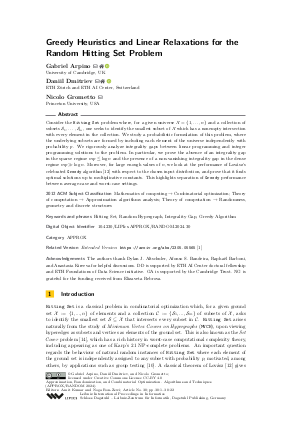Greedy Heuristics and Linear Relaxations for the Random Hitting Set Problem
Authors
Gabriel Arpino  ,
Daniil Dmitriev
,
Daniil Dmitriev  ,
Nicolo Grometto
,
Nicolo Grometto
-
Part of:
Volume:
Approximation, Randomization, and Combinatorial Optimization. Algorithms and Techniques (APPROX/RANDOM 2024)
Part of: Series: Leibniz International Proceedings in Informatics (LIPIcs)
Part of: Conference: International Conference on Approximation Algorithms for Combinatorial Optimization Problems (APPROX)
Part of: Conference: International Conference on Randomization and Computation (RANDOM) - License:
 Creative Commons Attribution 4.0 International license
Creative Commons Attribution 4.0 International license
- Publication Date: 2024-09-16
File

PDF
LIPIcs.APPROX-RANDOM.2024.30.pdf
- Filesize: 0.98 MB
- 22 pages
Document Identifiers
Related Versions
- Extended Version https://arxiv.org/abs/2305.05565
Subject Classification
ACM Subject Classification
- Mathematics of computing → Combinatorial optimization
- Theory of computation → Approximation algorithms analysis
- Theory of computation → Randomness, geometry and discrete structures
Keywords
- Hitting Set
- Random Hypergraph
- Integrality Gap
- Greedy Algorithm
Metrics
- Access Statistics
-
Total Accesses (updated on a weekly basis)
0PDF Downloads0Metadata Views
Abstract
Consider the Hitting Set problem where, for a given universe 𝒳 = {1, ..., n} and a collection of subsets 𝒮₁, ..., 𝒮_m, one seeks to identify the smallest subset of 𝒳 which has a nonempty intersection with every element in the collection. We study a probabilistic formulation of this problem, where the underlying subsets are formed by including each element of the universe independently with probability p. We rigorously analyze integrality gaps between linear programming and integer programming solutions to the problem. In particular, we prove the absence of an integrality gap in the sparse regime mp ≲ log(n) and the presence of a non-vanishing integrality gap in the dense regime mp ≫ log{n}. Moreover, for large enough values of n, we look at the performance of Lovász’s celebrated Greedy algorithm [Lovász, 1975] with respect to the chosen input distribution, and prove that it finds optimal solutions up to multiplicative constants. This highlights separation of Greedy performance between average-case and worst-case settings.
Cite As Get BibTex
Gabriel Arpino, Daniil Dmitriev, and Nicolo Grometto. Greedy Heuristics and Linear Relaxations for the Random Hitting Set Problem. In Approximation, Randomization, and Combinatorial Optimization. Algorithms and Techniques (APPROX/RANDOM 2024). Leibniz International Proceedings in Informatics (LIPIcs), Volume 317, pp. 30:1-30:22, Schloss Dagstuhl – Leibniz-Zentrum für Informatik (2024)
https://doi.org/10.4230/LIPIcs.APPROX/RANDOM.2024.30
BibTex
@InProceedings{arpino_et_al:LIPIcs.APPROX/RANDOM.2024.30,
author = {Arpino, Gabriel and Dmitriev, Daniil and Grometto, Nicolo},
title = {{Greedy Heuristics and Linear Relaxations for the Random Hitting Set Problem}},
booktitle = {Approximation, Randomization, and Combinatorial Optimization. Algorithms and Techniques (APPROX/RANDOM 2024)},
pages = {30:1--30:22},
series = {Leibniz International Proceedings in Informatics (LIPIcs)},
ISBN = {978-3-95977-348-5},
ISSN = {1868-8969},
year = {2024},
volume = {317},
editor = {Kumar, Amit and Ron-Zewi, Noga},
publisher = {Schloss Dagstuhl -- Leibniz-Zentrum f{\"u}r Informatik},
address = {Dagstuhl, Germany},
URL = {https://drops.dagstuhl.de/entities/document/10.4230/LIPIcs.APPROX/RANDOM.2024.30},
URN = {urn:nbn:de:0030-drops-210234},
doi = {10.4230/LIPIcs.APPROX/RANDOM.2024.30},
annote = {Keywords: Hitting Set, Random Hypergraph, Integrality Gap, Greedy Algorithm}
}
Author Details
Acknowledgements
The authors thank Dylan J. Altschuler, Afonso S. Bandeira, Raphaël Barboni, and Anastasia Kireeva for helpful discussions. DD is supported by ETH AI Center doctoral fellowship and ETH Foundations of Data Science initiative. GA is supported by the Cambridge Trust. NG is grateful for the funding received from Elizaveta Rebrova.
References
- Gabriel Arpino, Daniil Dmitriev, and Nicolo Grometto. Greedy heuristics and linear relaxations for the random hitting set problem, 2023. URL: https://arxiv.org/abs/2305.05565.
- Sander Borst, Daniel Dadush, Sophie Huiberts, and Samarth Tiwari. On the integrality gap of binary integer programs with gaussian data. Mathematical Programming, 2022. URL: https://doi.org/10.1007/s10107-022-01828-1.
- Sander Borst, Daniel Dadush, and Dan Mikulincer. Integrality gaps for random integer programs via discrepancy. In Proceedings of the 2023 ACM-SIAM Symposium on Discrete Algorithms, SODA, 2023. URL: https://doi.org/10.1137/1.9781611977554.ch65.
- Dingzhu Du, Frank K Hwang, and Frank Hwang. Combinatorial group testing and its applications. World Scientific, 2000. URL: https://doi.org/10.1142/4252.
- Yaniv Erlich, Anna Gilbert, Hung Ngo, Atri Rudra, Nicolas Thierry-Mieg, Mary Wootters, Dina Zielinski, and Or Zuk. Biological screens from linear codes: theory and tools. BioRxiv, 2015. URL: https://doi.org/10.1101/035352.
- Uriel Feige. A threshold of ln n for approximating set cover. Journal of the ACM (JACM), 1998. URL: https://doi.org/10.1145/285055.285059.
- William Feller and Philip M Morse. An introduction to probability theory and its applications. American Institute of Physics, 1958. URL: https://doi.org/10.1063/1.3062516.
- Antonio Fernández Anta, Miguel A Mosteiro, and Jorge Ramón Muñoz. Unbounded contention resolution in multiple-access channels. Algorithmica, 2013. URL: https://doi.org/10.1007/s00453-013-9816-x.
- Abdolhossein Hoorfar and Mehdi Hassani. Inequalities on the lambert w function and hyperpower function. Journal of Inequalities in Pure and Applied Mathematics, 2008. URL: https://arxiv.org/abs/2305.05565.
- Fotis Iliopoulos and Ilias Zadik. Group testing and local search: is there a computational-statistical gap? In Conference on Learning Theory. PMLR, 2021. URL: https://proceedings.mlr.press/v134/iliopoulos21a.html.
- David S Johnson. Approximation algorithms for combinatorial problems. In Proceedings of the fifth annual ACM symposium on Theory of computing, 1973. URL: https://doi.org/10.1145/800125.804034.
- László Lovász. On the ratio of optimal integral and fractional covers. Discrete mathematics, 1975. URL: https://doi.org/10.1016/0012-365X(75)90058-8.
- Marc Mézard and Marco Tarzia. Statistical mechanics of the hitting set problem. Physical Review E, 2007. URL: https://doi.org/10.1103/PhysRevE.76.041124.
- Vangelis T Paschos. A survey of approximately optimal solutions to some covering and packing problems. ACM Computing Surveys (CSUR), 1997. URL: https://doi.org/10.1145/254180.254190.
- Petr Slavík. A tight analysis of the greedy algorithm for set cover. In Proceedings of the twenty-eighth annual ACM symposium on Theory of computing, 1996. URL: https://doi.org/10.1145/237814.237991.
- Orestis A Telelis and Vassilis Zissimopoulos. Absolute O(log m) error in approximating random set covering: an average case analysis. Information Processing Letters, 2005. URL: https://doi.org/10.1016/j.ipl.2005.02.009.
- Ramon Van Handel. Probability in high dimension. Lecture notes, 2014. URL: https://api.semanticscholar.org/CorpusID:124828412.
